- Home
- Evelyn Waugh
Decline and Fall Page 5
Decline and Fall Read online
Page 5
' «Chick» was all for getting me on in the sporting world, and before I left school I was earning a few shillings a week holding the sponge at the Stadium on Saturday nights. It was there I met Toby Cruttwell. Perhaps you ain't heard of him, neither?
'No, I am terribly afraid I haven't, I'm not very well up in sporting characters.
'Sporting! What, Toby Cruttwell a sporting character! You make me laugh. Toby Cruttwell, said Philbrick with renewed emphasis, 'what brought off the Buller diamond robbery of 1912, and the Amalgamated Steel Trust robbery of 1910, and the Isle of Wight burglaries in 1914? He wasn't no sporting character, Toby wasn't. Sporting character! D'you know what he done to Alf Larrigan, what tried to put it over on one of his girls? I'll tell you. Toby had a doctor in tow at the time, name of Peterfield; lives in Harley Street, with a swell lot of patients. Well, Toby knew a thing about him. He'd done in one of Toby's girls what went to him because she was going to have a kid. Well, Toby knew that, so he had to do what Toby told him, see?
'Toby didn't kill Alf; that wasn't his way. Toby never killed no one except a lot of blinking Turks the time they gave him the V.C. But he got hold of him and took him to Dr Peterfield, and ‑ Philbrick's voice sank to a whisper.
'Second heat, get ready. Now, if you don't go when I say «Go», I shall disqualify you all; d'you hear? Are you ready? Go!
'… He hadn't no use for girls after that. Ha, ha, ha! Sporting character's good. Well, me and Toby worked together for five years. I was with him in the Steel Trust and the Buller diamonds, and we cleared a nice little profit. Toby took 75 per cent, him being the older man, but even with that I did pretty well. Just before the war we split. He stuck to safe-crackinf, and I settled down comfortable at the "Lamb and Flag", Camberwell Green. A very fine house that was before the war, and it's the best in the locality now, though I says it. Things aren't quite so easy as they was, but I can't complain. I've got the Picture House next to it, too. Just mention my name there any day you like to have a free seat.
'That's very kind of you.
'You're welcome. Well, then there was the war. Toby got the V.C. in the Dardanelles and turned respectable. He's in Parliament now ‑ Major Cruttwell, M.P., Conservative member for some potty town on the South Coast. My old woman ran the pub for me. Didn't tell you I was married, did I? Pretty enough bit of goods when we was spliced, but she ran to fat. Women do in the public‑house business. After the war things were a bit slow, and then my old woman kicked the bucket. I didn't think I'd mind much, her having got so fat and all, nor I didn't not at first, but after a time, when the excitement of the funeral had died down and things were going on just the same as usual, I began to get restless. You know how things get, and I took to reading the papers. Before that my old woman used to read out the bits she'd like, and sometimes I'd listen and sometimes I wouldn't, but anyhow they weren't the things that interested me. She never took no interest in crime, not unless it was a murder. But I took to reading the police news, and I took to dropping in at the pictures whenever they sent me a crook film. I didn't sleep so well, neither, and I used to lie awake thinking of old times. Of course I could have married again: in my position I could have married pretty well who I liked; but it wasn't that I wanted.
'Then one Saturday night I came into the bar. I generally drop in on Saturday evenings and smoke a cigar and stand a round of drinks. It sets the right tone. I wear a buttonhole in the summer, too, and a diamond ring. Well, I was in the saloon when who did I see in the corner but Jimmy Drage ‑ cove I used to know when I was working with Toby Cruttwell. I never see a man look more discouraged.
' "Hullo, Jirnmy!" I says. "We don't see each other as often as we used. How are things with you?" I says it cordial, but careful like, because I didn't know what Jimmy was up to.
' "Pretty bad," said Jimmy. "Just fooled a job."
' "What sort of job?" I says. "Nobbling," he says, meaning kidnapping.
' "It was like this," he says. "You know a toff called Lord Utteridge?"
' "The bloke what had them electric burglar alarms," I says, "Utteridge House, Belgrave Square?"
' "That's the blinking bastard. Well, he's got a son — nasty little kid about twelve, just going off to college for the first time. I'd had my eye on him," Jimmy said, "for a long time, him being the only son and his father so rich, so when I'd finished the last job I was on I had a go at him. Everything went as easy as drinking," Jimmy said. There was a garage just round the corner behind Belgrave Square where he used to go every morning to watch them messing about with cars. Crazy about cars the kid was. Jimmy comes in one day with his motor bike and side‑car and asks for some petrol. He comes up and looks at it in the way he had.
' "That bike's no good," he says. "No good?" says Jimmy. "I wouldn't sell it not for a hundred quid, I wouldn't. This bike," he says, "won the Grand Prix at Boulogne." "Nonsense!" the kid says; "it wouldn't do thirty, not downhill." "Well, just you see," Jimmy says. "Come for a run? I bet you I'll do eighty on the road." In he got, and away they went till they got to a place Jimmy knew. Then Jimmy shuts him up safe and writes to the father. The kid was happy as blazes taking down the engine of Jimmy's bike. It's never been the same since, Jimmy told me, but then it wasn't much to talk of before. Everything had gone through splendid till Jimmy got his answer from Lord Utteridge. Would you believe it, that unnatural father wouldn't stump up, him that owns ships and coal mines enough to buy the blinking Bank of England. Said he was much obliged to Jimmy for the trouble he had taken, that the dearest wish of his life had been gratified and the one barrier to his complete happiness removed, but that, as the matter had been taken up without his instructions, he did not feel called upon to make any payment in respect of it, and remained his sincerely, Utteridge.
'That was a nasty one for Jimmy. He wrote once or twice after that, but got no answer, so by the time the kid had spread bits of the bike all over the room Jimmy let him go.
' "Did you try pulling out 'is teeth and sending them to his pa?" I asks.
' "No," says Jimmy, "I didn't do that."
' "Did you make the kid write pathetic, asking to be let out?"
' "No," says Jimmy, "I didn't do that."
' "Did you cut off one of his fingers and put it in the letter‑box?"
' "No," he says.
' "Well, man alive," I says, "you don't deserve to succeed, you just don't know your job."
' "Oh, cut that out," he says; "it's easy to talk. You've been out of the business ten years. You don't know what things are like nowadays."
'Well, that rather set me thinking. As I say, I'd been getting restless doing nothing but just pottering round the pub all day. "Look here," I says, "I bet you I can bring off a job like that any day with any kid you like to mention." "Done!" says Jimmy. So he opens a newspaper "The first toff we find what's got a' only son," he says "Right!" says I. Well, about the first thing we found was a picture of Lady Circumference with her only son, Lord Tangent, at Warwick Races. "There's your man," says Jimmy. And that's what brought me here.
'But, good gracious, said Paul, 'why have you told me this monstrous story? I shall certainly inform the police. I never heard of such a thing.
'That's all right, said Philbrick. 'The job's off. Jimmy's won his bet. All this was before I met Dina, see?
'Dina?
'Miss Diana. Dina I calls her, after a song I heard. The moment I saw that girl I knew the game was up. My heart just stood still. There's a song about that, too. That girl, said Philbrick, 'could bring a man up from the depths of hell itself.
'You feel as strongly as that about her?
'I'd go through fire and water for that girl. She's not happy here. I don't think her dad treats her proper. Sometimes, said Philbrick, 'I think she's only marrying me to get away from here.
'Good Heavens! Are you going to get married?
'We fixed it up last Thursday. We've been going together for some time. It's bad for a girl being shut away like that, never seeing a man. She was in a state she'd have gone with anybody until I come along, just housekeeping day in, day out. The only pleasure she ever got was cutting down the bills and dismissing the servants. Most of them leave before their month is up, anyway, they're that hungry. She's got a head on her shoulders, she has. Real business woman, just what I need at the "Lamb".
'Then she heard me on the phone one day giving instructions to our manager at the Picture Theatre. That made her think a bit. A prince in disguise, as you might say. It was she who actually suggested our getting married. I shouldn't have had the race to, not while I was butler. What I'd meant to do was to hire a car one day and come down with my diamond ring and buttonhole and pop the question. But there wasn't any need for that. Love's a wonderful thing.
Philbrick stopped speaking and was evidently deeply moved by his recital. The door of the pavilion opened, and Mr Prendergast came in.
'Well, asked Paul, 'how are the sports going?
'Not very well, said Mr Prendergast; 'in fact, they've gone.
'All over?
'Yes. You see, none of the boys came back from the first race. They just disappeared behind the trees at the top of the drive. I expect they've gone to change. I don't blame them, I'm sure. It's terribly cold. Still, it was discouraging launching heat after heat and none coming back. Like sending troops into battle, you know.
'The best thing for us to do is to go back and change too.
'Yes, I suppose so. Oh, what a day!
Grimes was in the Common Room.
'Just back from the gay metropolis of Llandudno, he said. 'Shopping with Dingy is not a seemly occupation for a public‑school man. How did the heats go?
'There weren't any, said Paul.
'Quite right, said Grimes: 'you leave this to me. I've be
en in the trade some time. These things are best done over the fire. We can make out the results in peace. We'd better hurry. The old boy wants them sent to be printed this evening.
And taking a sheet of paper and a small stub of pencil, Grimes made out the programme.
'How about that? he said.
'Clutterbuck seems to have done pretty well, said Paul.
'Yes, he's a splendid little athlete, said Grimes. 'Now just you telephone that through to the printers, and they'll get it done to‑night. I wonder if we ought to have a hurdle race?
'No, said Mr Prendergast.
CHAPTER VIII The Sports
Happily enough, it did not rain next day, and after morning school everybody dressed up to the nines. Dr Fagan appeared in a pale grey morning coat and sponge-bag trousers, looking more than ever jeune premier; there was a spring in his step and a pronounced sprightliness of bearing that Paul had not observed before. Flossie wore a violet frock of knitted wool made for her during the preceding autumn by her sister. It was the colour of indelible ink on blotting paper, and was ornamented at the waist with flowers of emerald green and pink. Her hat, also home‑made, was the outcome of many winter evenings of ungrudged labour. All the trimmings of all her previous hats had gone to its adornment. Dingy wore a little steel brooch made in the shape of a bull‑dog. Grimes wore a stiff evening collar of celluloid.
'Had to do something to celebrate the occasion, he said, 'so I put on a «choker». Phew, though, it's tight. Have you seen my fiancée's latest creation? Ascot ain't in it. Let's get down to Mrs Roberts for a quick one before the happy throng rolls up.
'I wish I could, but I've got to go round the ground with the Doctor.
'Righto, old boy! See you later. Here comes Prendy in his coat of many colours.
Mr Prendergast wore a blazer of faded stripes, which smelt strongly of camphor.
'I think Dr Fagan encourages a certain amount of display on these occasions, he said. 'I used to keep wicket for my college, you know, but I was too short‑sighted to bc much good. Still, I am entitled to the blazer, he said with a note of defiance in his voice, 'and it is more appropriate to a sporting occasion than a stiff collar.
'Good old Prendy! said Grimes. 'Nothing like a change of clothes to bring out latent pep. I felt like that my first week in khaki. Well, so long. Me for Mrs Roberts. Why don't you come too, Prendy?
'D'you know, said Mr Prendergast, 'I think I will.
Paul watched them disappear down the drive in amazement. Then he went off to find the Doctor.
'Frankly, said the Doctor, 'I am at a loss to understand my own emotions. I can think of no entertainment that fills me with greater detestation than a display of competitive athletics, none ‑ except possibly folk‑dancing. If there are two women in the world whose company I abominate‑ and there are very many more than two — they are Mrs Beste‑Chetwynde and Lady Circumference. I have, moreover, had an extremely difficult encounter with my butler, who ‑ will you believe it? ‑ waited at luncheon in a mustard‑coloured suit of plus‑fours and a diamond tie‑pin, and when I reprimanded him, attempted to tell me some ridiculous story about his being the proprietor of a circus or swimming‑bath or some such concern. And yet, said the Doctor, 'I am filled with a wholly delightful exhilaration. I can't understand it. It is not as though this was the first occasion of the kind. During the fourteen years that I have been at Llanabba there have been six sports days and two concerts, all of them, in one way or another, utterly disastrous. Once Lady Bunyan was taken ill; another time it was the matter of the press photographers and the obstacle race; another time some quite unimportant parents brought a dog with them which bit two of the boys very severely and one of the masters, who swore terribly in front of everyone. I could hardly blame him, but of course he had to go. Then there was the concert when the boys refused to sing "God Save the King" because of the pudding they had had for luncheon. One way and another, I have been consistently unfortunate in my efforts at festivity. And yet I look forward to each new fiasco with the utmost relish. Perhaps, Pennyfeather, you will bring luck to Llanabba; in fact, I feel confident you have already done so. Look at the sun!
Picking their way carefully among the dry patches in the waterlogged drive, they reached the playing‑fields. Here the haphazard organization of the last twenty‑four hours seemed to have been fairly successful. A large marquee was already in position, and Philbrick ‑ still in plus‑fours ‑ and three gardeners were at work putting up a smaller tent.
'That's for the Llanabba Silver Band, said the Doctor. 'Philbrick, I required you to take off those loathsome garments.
'They were new when I bought them, said Philbrick, 'and they cost eight pounds firteen. Anyhow, I can't do two things at once, can I? If I go back to change, who's going to manage all this, I'd like to know?
'All right! Finish what you are doing first. Let us just review the arrangements. The marquee is for the visitors' tea. That is Diana's province. I expect we shall find her at work.
Sure enough, there was Dingy helping two servants to arrange plates of highly‑coloured cakes down a trestle table. Two other servants in the background were cutting sandwiches. Dingy, too, was obviously enjoying herself.
'Jane, Emily, remember that that butter has to do for three loaves. Spread it thoroughly, but don't waste it, and cut the crusts as thin as possible. Father, will you see to it that the boys who come in with their parents come in alone? You remember last time how Briggs brought in four boys with him, and they ate all the jam sandwiches before Colonel Loder had had any. Mr Pennyfeather, the champagne‑cup isnot for the masters. In fact, I expect you will find yourselves too much occupied helping the visitors to have any tea until they have left the tent. You had better tell Captain Grimes that, too. I am sure Mr Prendergast would not think of pushing himself forward.
Outside the marquee were assembled several seats and tubs of palms and flowering shrubs. 'All this must be set in order, said the Doctor; 'our guests may arrive in less than an hour. He passed on. 'The cars shall turn aside from the drive here and come right into the ground. It will give a pleasant background to the photographs, and, Pennyfeather, if you would with tact direct the photographer so that more prominence was given to Mrs Beste‑Chetwynde's Hispano Suiza than to Lady Circumference's little motor car, I think it would be all to the good. All these things count, you know.
'Nothing seems to have been done about marking out the ground, said Paul.
'No, said the Doctor, turning his attention to the field for the first time, 'nothing. Well, you must do the best you can. They can't do everything.
'I wonder if any hurdles have come?
'They were ordered, said the Doctor. 'I am certain of it. Philbrick, have any hurdles come?
'Yes, said Philbrick with a low chuckle.
'Why, pray, do you laugh at the mention of hurdles?
'Just you look at them! said Philbrick. 'They're behind the tea‑house there.
Paul and the Doctor went to look and found a pile of spiked iron railings in sections heaped up at the back of the marquee. They were each about five feet high and were painted green with gilt spikes.
'It seems to me that they have sent the wrong sort, said the Doctor.
'Yes.
'Well, we must do the best we can. What other things ought there to be?
'Weight, harmner, javelin, long-jump pit, high-jump posts, low hurdles, eggs, spoons, and greasy pole, said Philbrick.
'Previous!y competed for, said the Doctor imperturbably. 'What else?
'Somewhere to run, suggested Paul.
'Why, God bless my soul, they've got the whole park! How did you manage yesterday for the heats?
'We judged the distance by eye.
'Then that is what we shall have to do to‑day. Really, my dear Pennyfeather, it is quite unlike you to fabricate difficulties in this way. I am afraid you are getting unnerved. Let them go on racing until it is time for tea; and remember, he added sagely, 'the longer the race the more time it takes. I leave the details to you. I am concerned with style. I wish, for instance, we had a starting pistol.
'Would this be any use? said Philbrick, producing an enormous service revolver. 'Only take care; it's loaded.
'The very thing, said the Doctor. 'Only fire into the ground, mind. We must do everything we can to avoid an accident. Do you always carry that about with you?

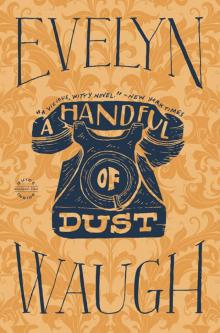 A Handful of Dust
A Handful of Dust Complete Stories of Eveyln
Complete Stories of Eveyln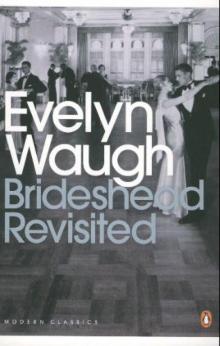 Brideshead Revisited
Brideshead Revisited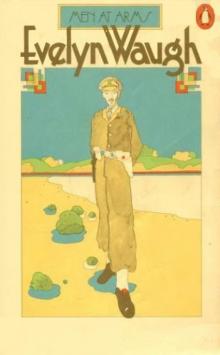 Men at Arms
Men at Arms Black Mischief
Black Mischief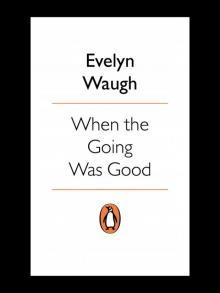 When the Going Was Good
When the Going Was Good Officers and Gentlemen
Officers and Gentlemen Helena
Helena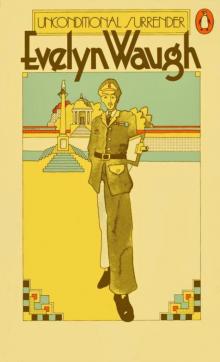 Unconditional Surrender
Unconditional Surrender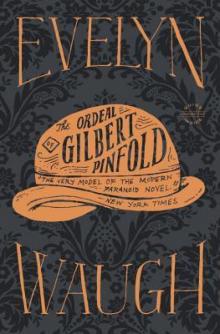 The Ordeal of Gilbert Pinfold
The Ordeal of Gilbert Pinfold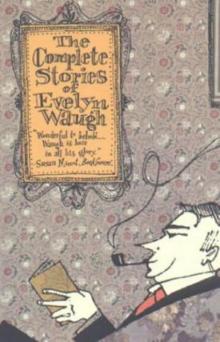 The Complete Stories Of Evelyn Waugh
The Complete Stories Of Evelyn Waugh